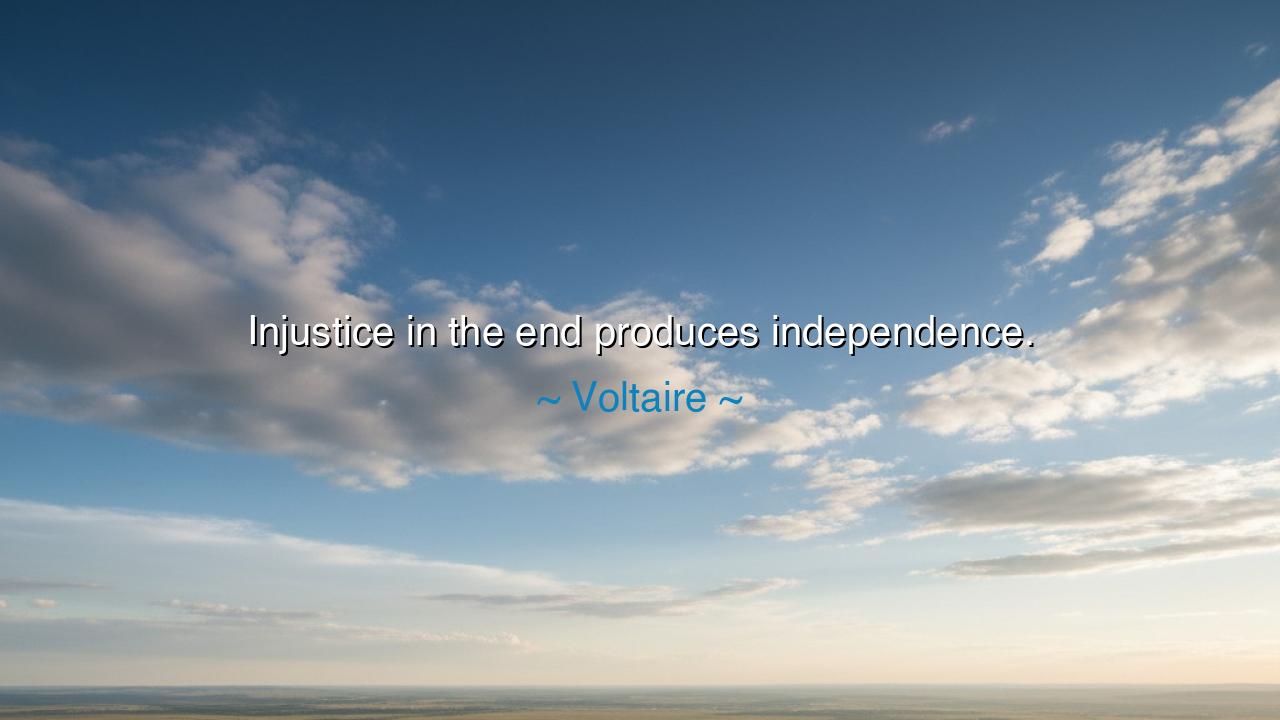
Injustice in the end produces independence.






Hear now the immortal words of Voltaire, the sage of the Enlightenment, the restless spirit who warred against tyranny with wit sharper than any sword: “Injustice in the end produces independence.” Within these few words lies a thunderous truth — that oppression, when pressed too far, awakens the very force it seeks to destroy. The hand that would shackle the human spirit only tightens its own doom, for the soul of man, born for liberty, cannot endure injustice forever. Like a seed buried in stone, it breaks its shell in the darkness and rises toward light. Voltaire, who had witnessed both cruelty and cowardice in his time, spoke these words as prophecy: that independence is the child of suffering, and freedom is the rebellion of the wronged.
The origin of this quote emerges from the heart of the 18th century — an age of kings and inquisitions, of power disguised as order, of faith twisted into persecution. Voltaire, born François-Marie Arouet, had himself suffered the sting of injustice. Imprisoned in the Bastille for his writings, exiled for his words, and condemned by priests for his reason, he came to see that the cruelty of authority does not silence truth — it amplifies it. The lash of oppression, he observed, awakens the will to resist. The more one attempts to suppress the cry of conscience, the louder it becomes. Thus he wrote, in the fire of his experience, that injustice, carried too far, kindles the flame of independence. The oppressor sows the seeds of his own undoing.
History itself bears witness to this eternal law. Consider the American Revolution, born from the heavy hand of empire. For years, the colonists bore the burden of taxation without voice, governance without consent. But each act of injustice — each law imposed, each right denied — only strengthened their resolve. The Stamp Act, the Tea Tax, the quartering of soldiers: all were intended to subdue, yet all became fuel for rebellion. When at last the fire erupted in 1776, it was not a spark of greed or ambition that lit it, but the moral truth that injustice produces independence. The Declaration of Independence itself stands as a monument to Voltaire’s wisdom — the cry of a people who, through suffering, discovered their strength.
So too in the story of India, where centuries of colonial rule sought to crush the spirit of a nation. The British Empire imposed its will upon millions, stripping the land of its wealth and its people of their dignity. Yet from this long injustice arose a movement unlike any before — the movement of Mahatma Gandhi, who turned oppression into moral power. His weapon was not the sword, but truth; not hatred, but endurance. He understood that the more unjust the rule, the greater its weakness becomes before the eyes of the world. And so, through patience and suffering, India reclaimed her independence, not merely as a political state, but as a moral awakening for all humankind.
Voltaire’s words speak not only of nations, but of souls. For injustice exists not only in the courts or in the palaces of kings — it lives wherever power seeks to silence truth, wherever fear stifles conscience. Yet always, the soul resists. When a person is wronged, something deep within them rises — an ember of dignity, an ancient fire that refuses to die. The cruel teacher creates the questioning mind; the unjust master, the rebel heart. Even in bondage, the human spirit dreams of independence, and that dream becomes the seed of transformation. It was this truth that moved the enslaved, the oppressed, and the voiceless throughout history to break their chains — for the spirit of man, once awakened, cannot be enslaved again.
This, then, is the paradox of injustice: it seeks to destroy freedom, but instead becomes its maker. The tyrant, in his arrogance, believes fear will preserve his rule; yet every act of cruelty deepens the hunger for liberty. The jailer locks the door, but the prisoner’s mind escapes first. The censor burns the book, but its ideas take root in ten thousand hearts. Voltaire knew this well. His pen, banned and condemned, outlived his persecutors and helped ignite the Age of Enlightenment — a time when humanity began to see that authority must answer to reason, and kings to their people.
O listener, take this wisdom into your heart: when you see injustice, do not despair, for even in its shadow the seed of freedom is growing. Every wrong endured with courage, every truth spoken under threat, every act of conscience — these are sparks that will one day blaze into independence. The oppressor may triumph for a season, but no chain forged by men can bind the will forever. In your own life, when you meet injustice, let it awaken your strength, not your bitterness. Stand firm in truth, and know that resistance, when born of righteousness, is the path to liberation.
Thus let Voltaire’s words echo through the ages, both warning and promise: “Injustice in the end produces independence.” Beware, O rulers, lest your cruelty awaken the courage of those you wrong. And take heart, O oppressed, for every burden borne with integrity brings you nearer to freedom. The night of tyranny is long, but the dawn of justice is certain — for even the darkest injustice cannot endure against the eternal rising of the human spirit.






AAdministratorAdministrator
Welcome, honored guests. Please leave a comment, we will respond soon